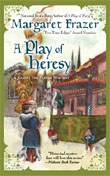CHAPTER 3
“The other guilds have only lately begun to ready their plays,” Basset said. “Word is out that the shearmen and tailors are set to spare nothing this year to make their own splendiferous beyond anything it’s ever been before. It being the Annunciation and Nativity –”
“And a half dozen other things, like jumble in a box,” Ellis muttered.
“– there are chances in plenty to fulfill their desire,” Basset continued, ignoring him, “and I gather that the other guilds are taking up the challenge to rival whatever the shearmen and tailors are doing. So there’s now something of a scramble for a greater leavening of skilled players among the general rout of once-a-year folk. Remember William Sendell?”
Despite what might be thought, there was indeed professional theater in medieval England, and modern scholarly studies show it was thriving.
Documents tell, of course, of travelling companies of players all over the country, performing in all sizes and kinds of venues. Many of these companies belonged to great and lesser lords and even gentry, and they were certainly more numerous than we know. Between 1450 and 1496, we have record in Yorkshire’s West Riding alone of performances by companies of players belonging to King Henry VI, the duke of York, Lord Plumpton, J. Harrington, Lord Eure, Sir Edward Hastings, Sir John Selbayne, King Edward IV, Lord Fitzhugh, Lord Lovell, the earl of Westmorland, Lord Tyrell, the duke of Gloucester, Lord Scroop, Lord Percy, and King Henry VII. [1]
We also know that “players of large centres such as Coventry whose core of professional players were familiar figures on the roads of Warwickshire, Oxfordshire, and Gloucestershire”[2] and that there were professional players who hired out individually to produce and direct local efforts, such as for parishes, since “parish drama in its many forms was a money-making venture that allowed the churchwardens to keep the fabric of their ancient churches together.”[3] For instance, we “know that in Essex and Kent in the early sixteenth century [when things had changed little from the 1400s] they could already call on professional help from ‘property players’ (producers) from London who would organise the set and special effects, using their expertise and local labour.”[4] And: “By all accounts the non-cycle plays were performed for profit rather than as a display of power and wealth or as a means of pious education for the unlettered. These plays . . . sometimes acted as an important part of parochial capital building campaigns; they helped build whole church towers, replace roofs, and add aisles to parish churches. They brought . . . a nearly surefire source of income to ailing or ambitious parishes everywhere in [East Anglia] . . . during the late fifteenth and sixteenth centuries.”[5]
Add to all of that the undoubted fact that a number of cities and towns found it worth their while the mount the elaborate and costly cycle plays on a regular basis for more than a century, drawing on professional help to augment their citizens’ participation, and you have every indication that professional theater was alive, widespread, and doing very well in medieval England.
So the little I was able to use about players and their work in A Play of Heresy leaves much, much more to tell.
– Margaret
[1] John M. Watson, ‘A Parish Play in the West Riding of Yorkshire’, English Parish Drama, ed. Alexandra F. Johnston, p.156.
[2] Alexandra F. Johnston, ‘What Revels are in Hand’, ibid., p.101.
[3] ibid.
[4] Meg Twycross, ‘The theatricality of medieval English plays’, The Cambridge Companion to Medieval English Theater, ed. Richard Beadle, 1994, p.65.
[5] John C. Coldewey, ‘The non-cycle plays and the East Anglian tradition’, ibid.
Follow the virtual bookclub for A Play of Heresy on Facebook and Twitter.
















